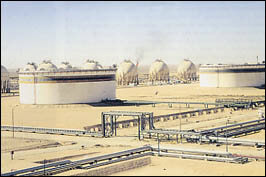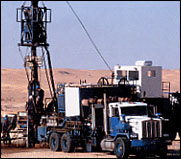 LIBERALIZING THE OIL AND GAS SECTOR LIBERALIZING THE OIL AND GAS SECTOR |
The major business opportunity to look out for is Sonatrach, the national company in charge of the transportation, and commercialization of hydrocarbon. Since its creation in 1971, Sonatrach has been able to maintain a quasi-monopoly of the hydrocarbon sector. By 1991, the company had managed to secure all the country's oil investments, and by 1999 it was posting sales of US$ 14.22 million. Today, Sonatrach is the largest exporter of natural gas in Africa, and the third-largest exporter worldwide with an output of 60 million cubic meters per annum.
As the State-owned oil and gas operator, Sonatrach has led the country to huge oil and gas discoveries in the Sahara desert. Today, new government policies are oriented towards the liberalization of the hydrocarbon sector, and the opening of Sonatrach to foreign investment.

According to Abdelhak Bouhafs, former General Manager of Sonatrach, "this is a gradual process that will be completed within few months. The decisive stage will come when Sonatrachis no longer permitted by law to be the sole and exclusive partner to foreign companies involved in Algeria's oil exploitation. Once an agency is created to advertise and negotiate all contracts on behalf of the State, then Sonatrach will become a company like all the others".
Bouhafs adds: "2001 will be a crucial stepping stone in the company's transformation as for now, it will only have an industrial and commercial mission." On a legal level, Bouhafs indicates that it will be important to "separate the role of State as shareholder in Sonatrach, and the role of the State as a regulatory body, which has to partially oversee the market. This transformation can progress faster or slower according to the evolution of mentalities, but there are hints showing that they are evolving."
The deadline set to reform Sonatrach culminates in 2005. "Sonatrach has first to become a company without government interference. Once this condition satisfied, it can either be partially privatized, or opened to an IPO (Initial Public Offering) on the stock market".
A new Hydrocarbons Bill will mark the end of the State monopoly, hence transforming Sonatrach into a private company, and delegating all regulatory responsibilities to ALNAFT - the agency that will act as technical controller, tax inspector and negotiator on behalf of the State. The Bill also plans to downsize Sonatrach, laying off at least 30% of its employees and opening part of its capital on the stock market.
The proposal prompted the resignation of Sonatrach' s General Manager, Abdelhaf Bouhafs, on grounds that this was too much too soon. But this time, the government stood out, and after intense negotiations with the unions, the Hydrocarbons Bill is moving ahead. | For foreign oil companies the adoption of this bill will free them from Sonatrach' s current monopoly. Previously, foreign oil companies had to enter in association with Sonatrach before they could invest in Algeria.
As a result, Sonatrach established mining partnerships with Anadarko, Alpeco, Agip, Arco, Bhp Hamilton, Cepas, Plus Petrol, Mobil, West Oil, Repsol, Petro Canada, BP, Petronas and Neste Oil for instance.
In addition, the bidding process for new exploration blocks will become more transparent and efficient. Previous negotiations could last for years - for over two years PetroCanada was in negotiations with Sonatrach for the development of one of its fields, and never even reached an agreement.
"A more predictable and more reliable quicker decision-making process will make business even more attractive in Algeria. It will also continue to demonstrate that the hydrocarbon sector is a model for foreign investment", said William D. Sullivan, Anadarko Vice President for International Operations.
Fodil Hadibi, President of BJSP, agrees with Sullivan. "This new system is totally on line with our strategy because it will increase the speed of tender offers and of contracts completed. This will also translate into a faster execution of drilling, which will allow us to build a greater number of wells in a shorter amount of time."

BJSP, a joint-venture company between BJ Services USA and ENSP, Sonatrach's petroleum services company, is a success story in itself, directly competing with international heavyweights Schlumberger and Halliburton, and holding its own with 28% of the total petroleum services market. "Our joint venture has allowed us to maximize American know-how together with the local expertise of an Algerian company... It is a perfect marriage that has brought together two cultures, and helped us to evolve and succeed."
Hadibi is bullish on the future of BJSP. Not only has the company increased its capital from $5 million in 1986 to $7 million today, but profitability is up to 18%, and new opportunities are up for grabs. BJSP is not only expanding vertically through new partnerships, but also expanding horizontally to increase services and market share. "We are extremely excited about the future of Algeria's oil and gas prospects," concludes Hadibi. |

